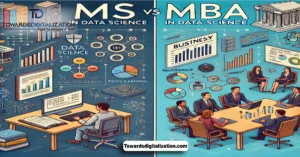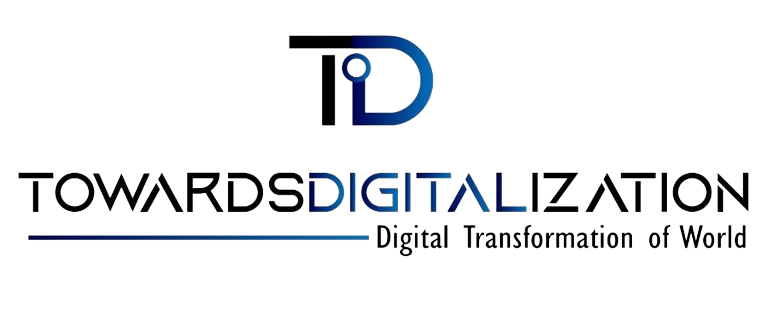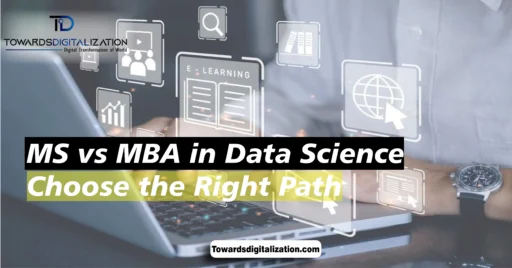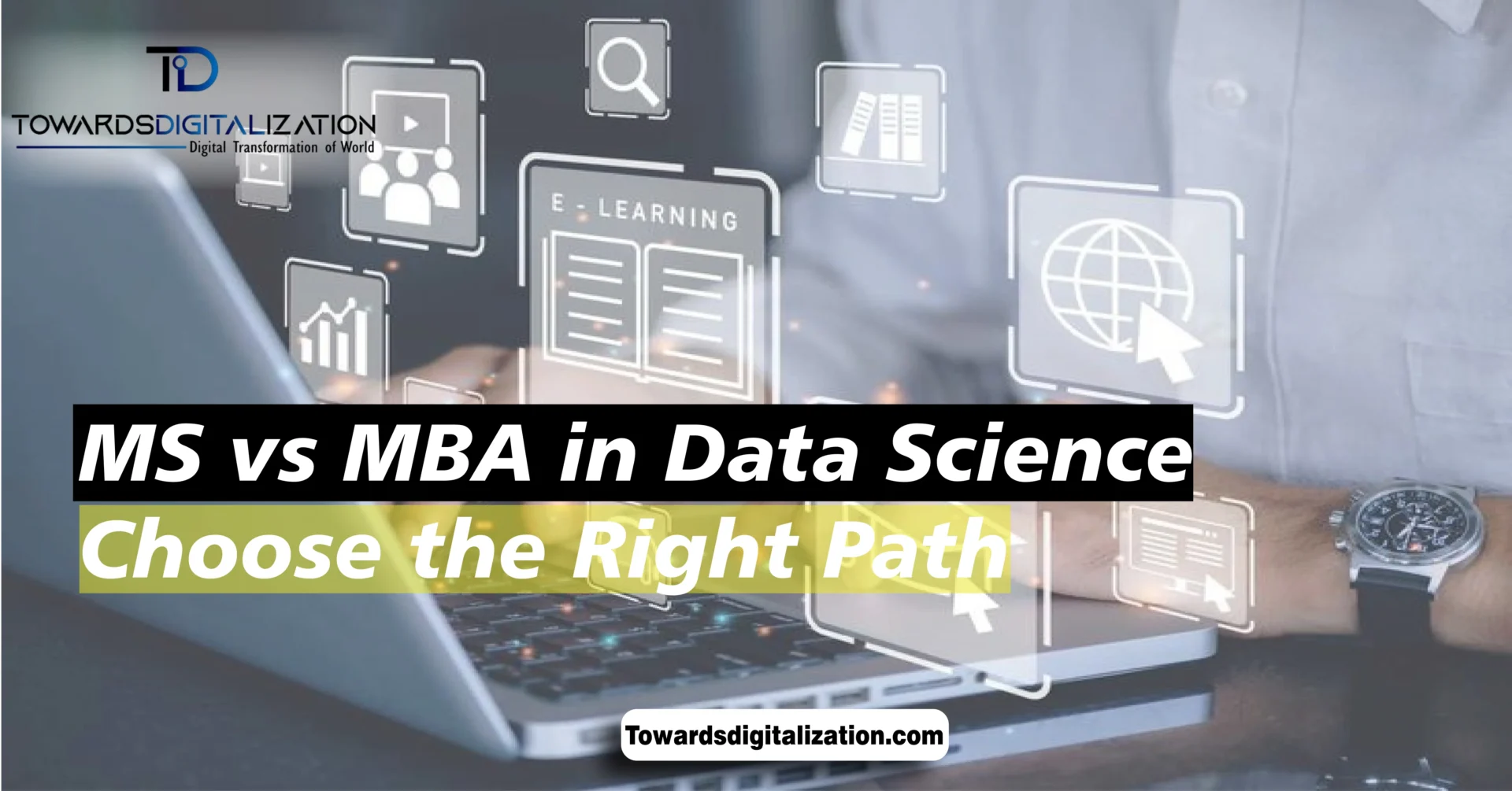Introduction
The decision between an (MS vs MBA) MS in Data Science and an MBA in Data Science can be complicated because both programs cater to different objectives and skills. An MS in Data Science offers students a thorough foundation in modern technologies with emphasis on machine learning, programming and analytics. It’s an ideal option for data scientists looking to become engineers or advance in their technical careers.

On the other hand, the MBA that includes Data Science combines the business of leadership and data-driven decision-making to prepare individuals for the most strategic and management positions in the organization. Knowing your course options’ differences in direction, goals, and content enables you to make an educated choice about which will meet your immediate needs and desires best.
What’s the Difference between (MS vs MBA)?
The primary difference between MS and MBA degrees in data science, specifically as data specialization specialties, are their respective foci and outcomes in terms of career advancement. While an MS emphasizes technical aspects such as statistics programming machine-learning data models. Its graduates frequently find employment such as computers scientists machine-learning experts or data analysts requiring extensive data technology knowledge.
Contrary to that, the other direction, the MBA with the Data Science focus, emphasizes leadership strategies and business decisions. The graduates use their accumulated knowledge to make strategic choices in management or executive positions. Common jobs include management of business intelligence and analytics consultant—even chief of data.
When you decide between the two options, it will depend on whether you want to establish a solid technical basis for tackling data problems or use data to guide teams and boost the growth of your business.
Understanding the MS in Data Science
A Master’s degree with a concentration in Data Science is tailored to people interested in statistics, analysis, and programming. The course covers a wide range of topics that are more advanced, such as.
- Machine Learning refers to the study and creation of algorithms and models which predict outcomes.
- Artificial Intelligence uses AI methods to solve real world issues.
- Big Data Technologies works with Hadoop, Spark, and cloud-based platforms.
- Advanced Mathematics and Statistics The goal is to understand the statistical models and the probability thoroughly.
- Programming, Data and Programming Tools Learning to master Python, R, SQL, and data visualization tools.
This program equips students with the ability to address intricate technical problems and innovate within data-driven research fields. Ideally suited for those who enjoy devising methods for large datasets as well as devising ways of approaching difficult problems head-on, this degree will equip students with all they need for success in life and academia.
Understanding the MBA with a Data Science Specialisation
An MBA with a Data Science specialisation blends traditional business knowledge with modern analytical skills. This course is geared towards people who wish to project teams that use data to make crucial decisions based on information derived from the data. Some of the topics covered are
- Strategic Making Learn the use of information to inform business decisions.
- Data Analytics in Business Learning is used to analyze data and use the results to improve business practices.
- Leaders and Managers Learning to manage teams as well as the work of others.
- Predictive Modelling and Business Intelligence Tools for learning and methods to predict the future and guide businesses’ decisions.
They are well-equipped to lead analytics teams, spot patterns in the data, and devise strategies to help drive business growth. This is a great program for those who wish to integrate technical expertise and expertise in business.
(MS vs MBA) Basics
An MBA (Master of Business Administration) is a postgraduate degree designed to improve management, strategy and leadership abilities. The most common subjects are:
- Finance understanding the financial aspects of corporate finance, investment and managing risk.
- Marketing Learn strategy to the analysis of markets and customer interaction.
- Operations managing supply chains and improving the business process.
- Organizational behaviour: The study of the dynamics of teams, leadership and work culture.

The addition of a Data Science specialization extends the curriculum to encompass data-driven tools as well as methods, including:
- Data Analytics: Mining meaningful insight from data.
- Business Intelligence: Making use of data to design effective strategies.
- Predictive modelling forecasts trends to aid in decisions.
This mix of managerial and technical abilities makes the graduates adept and able to handle challenging business problems.
Full-Time or Part-Time for (MS vs MBA)?
MBA courses are available in full-time as well as part-time styles and cater to a variety of needs:
- Full-Time MBA:
- Normal timeline for study typically ranges between one and two years.
- Providing candidates the time necessary to fully dedicate themselves to their education and network as much as possible.
- Part-Time MBA:
- This is for professionals working in the field who want to pursue their education while working.
- It is often longer and can take 2-4 years to complete.
- It is flexible; however, it requires great time control.
Your choice between these options depends upon your level of professional experience and financial status. Full-time studies can be especially beneficial to people looking for career changes; while part-time options could work better suited for professionals seeking career advancement within their current employment roles.
(MS vs MBA) Online or On-Campus?
Numerous institutions offer MBA courses with both online as well as off-campus formats.
- Online MBA:
- It allows you to take your learning to any location.
- It helps students balance working, family life, and learning.
- Most often, virtual networking is part of the plan and group work.
- On-Campus MBA:
- Experience more immersive interactions through face-to-face conversations.
- Access campus resources and events.
- Socializing and networking – and develop an increased sense of community and cooperation!
Select based on your individual needs, learning preferences, and goals for your career. The online programs are perfect for those working or unable to relocate. Campus-based programs provide a more traditional education that includes more interactive learning.
Accreditation
- AACSB (Association to Advance Collegiate Schools of Commerce): Recognized globally for its high-quality business schooling.
- AMBA (Association of MBAs): Focuses on postgraduate management education.
- EQUIS (European Quality Improvement System): Evaluates programs according to their academic rigour and relevance to business.
Accelerated Programs
If you are looking to accelerate their education, programs that are accelerated offer the following options:
- Accelerated MS Programmes usually completed within 12 to 18 months. These programs are rigorous and designed specifically for those with a technological experience.
- Accelerated MBA Courses usually completed in twelve to fifteen months, these programs focus on business fundamentals and specific areas of study, which allows students to return to work in a short time.
GMAT or No GMAT?
Standardised tests such as GMAT or the GMAT and GRE are usually required to be passed for admission to MBA programs as well as some MS programs. Many institutions provide the GMAT exemption or do not need the test in any way. Instead, they might think about:
- Employment Experience Professional experience that is relevant could help offset the test score.
- academic background High school performances in similar fields could suffice.
- Alternate Tests Some programs have an aptitude test of their own that concentrate on personal interviews and essays.
Cost of (MS vs MBA)
The price of the MS of Data Science or an MBA with the Data Science specialization varies widely dependent on variables such as place of study, location of the institution, as well as the format of the program. Generally:
- MS Data Science: Tuition charges can be as low as $20,000-$70,000, based the school and university.
- MBA that includes Data Science Specialization: The cost ranges between $30,000 to $120,000 and the best programs tend to be higher priced.
Data Science, Data Analytics, Business Analytics
- Data Science: It focuses on technical expertise that is advanced such as programming, machine learning as well as large data. Ideal for positions such as data scientist or AI specialist.
- Data Analytics The focus is on extracting valuable insights from data through techniques of statistical analysis and visualization. The ideal role for data analysts.
- business Analytics The process combines analytics of data and business strategies that focuses on decision-making as well as solving problems in the context of business. Trains graduate for managerial positions.
Conclusion About (MS vs MBA)
The decision to pursue either an (MS vs MBA) in Data Science depends on your ambitions for the future, your skills and goals for professional development. The MS of Data Science focuses on building an expert technical knowledge in the fields of data analytics, machine-learning, as well as programming. It is perfect for people who wish to be data scientists, engineers, analysts or. In contrast the MBA is a master’s degree in Data Science combines business strategy and data-driven decision-making to prepare experts for roles in leadership, including data managers, or analysts of business intelligence.
Pick a MS If you like a deeper dive into technical expertise and wish to tackle difficult data issues. Choose the MBA If you want to connect the business and technical departments to drive growth for your organization with data-driven insights.
Frequently Asked Question
Question 1: What should I consider between an (MS vs MBA) for Data Science?
- MS: Select whether you would like to concentrate on technical positions (e.g. machine learning, data scientist engineer) and develop solid data science abilities.
- MBA Choose the option to mix business leadership with data science. You can aim at roles such as the data manager or Chief Data Officer (CDO).
Question 2: Although the GMAT is optional at some colleges, can I be taking it regardless?
In the event that you’ve developed a solid academic background but the school does not require it, then you don’t need to. But, a high GMAT score can help you improve your application and show your proficiency in academic and quantitative courses.
Question 3: Can I just get an academic degree in business and include data science certifications after ward?
Yes, you are able to pursue the business degree (MBA) initially and later get data science certificates. This is an excellent alternative if you wish to build your business acumen first and then add technical expertise later. But, they may not provide the same level of depth like the MS with a concentration in Data Science.
Question 4: Which is the best degree to someone looking for the field of technical data?
If you are looking to concentrate on roles in technical data, including data scientist data engineer, or analyst, then an MS degree in Data Science is the better selection.
Question 5: Are the MBA with a concentration in Data Science suitable for someone without a technical background?
Absolutely, having an MBA is a great option. Data Science is a great choice for people who don’t have an extensive technical background since it blends the business and data analysis and focuses on the use of data within business environments instead of in-depth programming or technical abilities.








